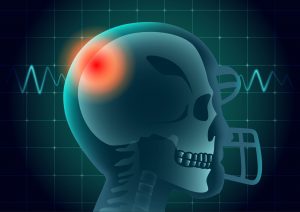
By solar22 at Shutterstock
According to the Centers for Disease Control and Prevention (CDC), nearly 2.8 million people in the United States were treated for a traumatic brain injury in 2013. That is an astounding number of accidents. The leading causes of traumatic brain injuries include slips and falls, traffic accidents, assault, and being struck by an object. According to the reports, there were:
- 1,320,411 traumatic brain injuries caused by falls
- 430,836 traumatic brain injuries caused by being struck
- 383,293 traumatic brain injuries caused by vehicle accidents
- 255,112 traumatic brain injuries caused by assault/self-harm
- 217,141 traumatic brain injuries caused by unknown cases
- 190,959 traumatic brain injuries caused by “other” sources
Traumatic Brain Injury Causes
A brain injury is any type of trauma to the brain that affects the individual physically, emotionally, or behaviorally. Many brain injuries occur at birth, though most occur later due to trauma or illness. Depending on the cause of the brain injury, the situation may be deemed traumatic or non-traumatic. It is up to the doctor to determine which is more appropriate.
As shown in the information gathered by the Centers for Disease Control and Prevention, the majority of traumatic brain injuries occur due to slip and fall accidents. The next common cause is being struck, such as a football injury. Next, we have vehicle accidents. Whiplash is quite a common cause of traumatic brain injuries in a vehicle. When the brain slams against the interior of the skull, it can lead to internal bleeding, bruising, and concussions. Such injuries are considered traumatic brain injuries.
Then, you have non-traumatic brain injuries. Such incidents are often the result of serious illness or medical conditions, not the result of trauma or a blow to the skull. These types of injuries include:
- Stroke
- Hypoxia (lack of oxygen to the brain)
- Tumors
- Cancer
- Brain infections or inflammation
As you can see, non-traumatic brain injuries can vary greatly.
Traumatic Brain Injury Symptoms
Traumatic brain injuries have a wide range of physical and psychological symptoms and long-lasting effects. Many of these signs appear immediately following the accident or traumatic event. Others may not appear in full for days or weeks down the line. The situation varies depending on the individual and the accident itself.
Some of the most common symptoms of a mild traumatic brain injury include:
Physical Symptoms
- Loss of consciousness
- Headache
- Nausea
- Vomiting
- Fatigue
- Trouble with speech
- Difficulty sleeping
- Dizziness or loss of balance
Sensory Symptoms
- Blurred vision
- Ringing in the ears
- Horrible taste
- Sensitivity to light or sound
Cognitive or Mental Symptoms
- Memory or concentration troubles
- Mood swings
- Depression or anxiety
These are just for mild traumatic brain injuries. For moderate to severe traumatic brain injuries, the symptoms worsen and appear within the first few hours to days. Patients experience symptoms such as persistent headaches, vomiting, weakness, loss of coordination, dilation, convulsions, seizures, combativeness, and even coma.
If you or a loved one has suffered a traumatic brain injury and requires support, contact TryMunity. We are the leading support network for traumatic brain injury victims and families. Join Trymunity today at community.trymunity.com.



